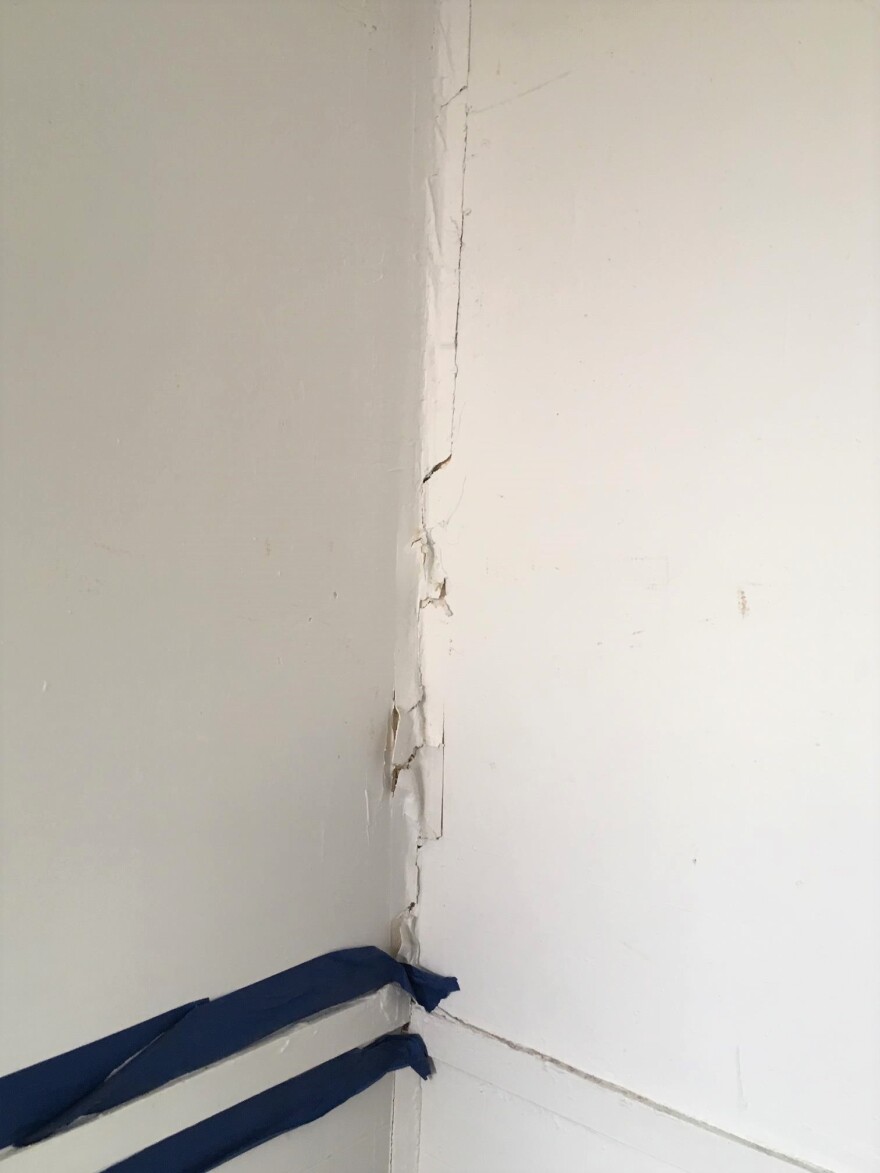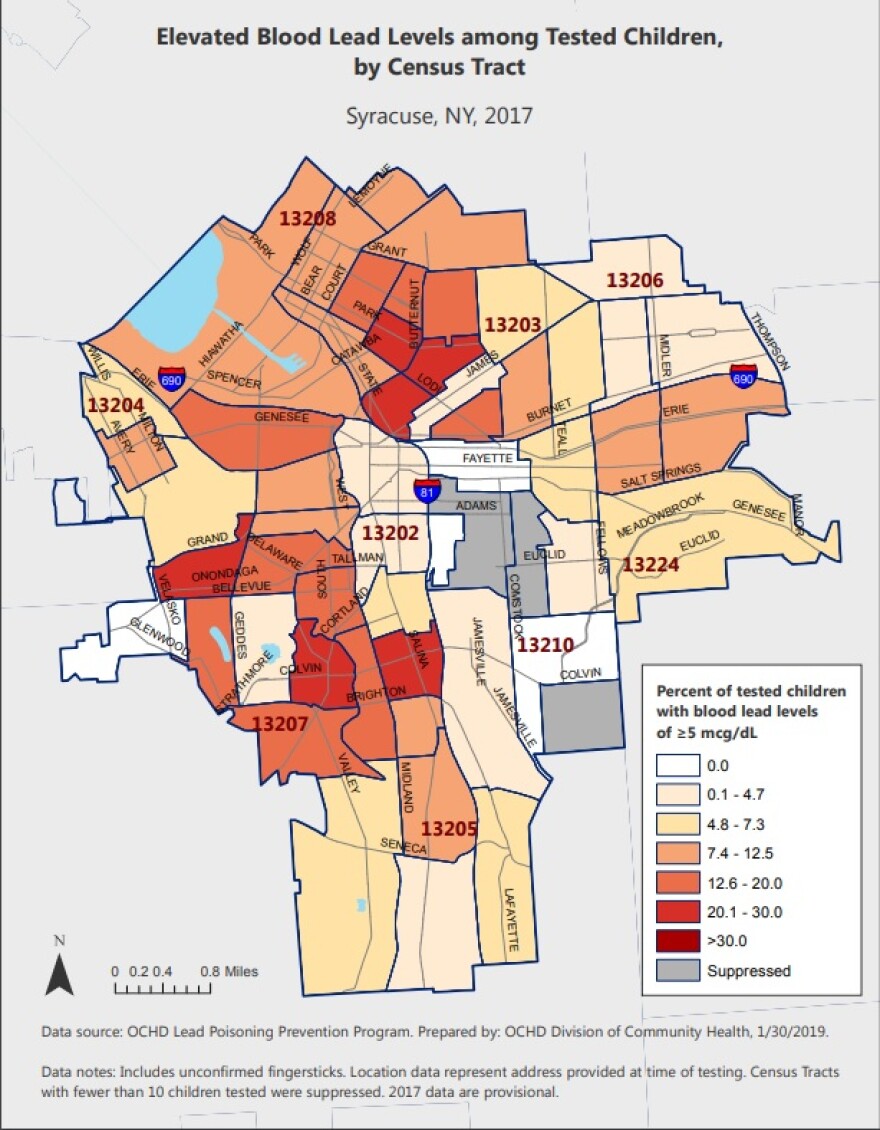Onondaga County, and especially Syracuse, continue to grapple with a serious and stubborn lead problem. The old housing stock combined with high poverty levels and low home ownership rates mean efforts to rid homes of lead paint have been painfully slow for decades. Here's how the crisis has impacted one north-side family:
Darlene Medley rents a house in the very back of a multi-dwelling lot on Pond Street in Syracuse. Food cooks on the stove in the sparse kitchen as she tells me her and her twin sons moved here in late 2017 with help from the county and Catholic Charities. The crumbling foundation of the house she was renting on the south side made it unfit for habitation. About a year after moving in to the Pond Street house, she was at a WIC appointment with her two-year-old boys, who were required to take a lead test. Results showed they both have low to moderate blood lead levels.
“I called the landlord and said I didn’t think that the lead was coming from here because you said everything was brand new. My assumption was that it was coming from my old place because it was deemed unfit. I was really shocked when they came, and it was three pages of lead violations here.”
In late February, Medley says she went to court, and about two dozen other tenants were there. All were renting from the same landlord, and all had lead problems that weren’t being addressed.
“They allowed this landlord to fail lead inspections 3 and 4 different times. But if I fail to pay my rent just one time, and he can prove it properly, guess what? I get a 72 hour [eviction] notice on my door. But he can fail a lead inspection, which is a health violation for children?”
Medley says the landlord’s contractors have done little to properly check for or clean up the lead. She says now, the house supposedly passes. Medley says she’s even taken it upon herself to paint the bathroom and kitchen.

The concern lies with the long term health impact on children. Dr. Howard Weinberger has been a pediatrician at SUNY Upstate for 60 years, and has been involved with the lead poisoning resource center for much of that time. He says in decades past, he saw many kids with very high levels to the point where they needed hospitalization. He says those who survived were left blind, prone to seizures, and developmentally delayed. Today, Weinberger says the impact is more subtle but still concerning.
“There are behavioral issues. Some children have ADHD. There are clearly associations in adolescents and young adults of violent behavior linked to early childhood exposure to lead.”
The state department of health has mandated that all children ages 1 and 2 be tested for lead exposure since the late 1970’s, when lead was banned from paint. Despite progress, Weinberger says testing could be more robust.
“Lots of kids slip through the cracks. Lead exposure doesn’t give you any overt symptoms early on to the parents and the doctors. You can’t tell has lead exposure unless you do a blood test. It is a critical part of the program…selling the idea that all children at 1 and 2 should have a blood lead test.”
At the same time, Weinberger says it’s backwards. He likens it to the canary in the coal mine, where the children have been the canaries.

“What we’re doing is testing the child instead of testing the house. Ideally, from a pediatrician’s point of view, we’d want to have primary prevention. Check the house before you move in there. If the home is potentially at risk for lead exposure, remediate that before the child is exposed in the first place.”
That likely would have prevented Darlene Medley’s twins from ingesting lead chips and dust. Their levels put them in the top two percent of the roughly 11 percent of Syracuse children with elevated blood lead levels. They also live in a census tract where about one quarter of children tested have lead in their system. But Medley isn’t sure what to do.
“I feel like I’m stuck. I don’t have any other choice. Either we become homeless, stay in the shelter until we find someplace better, or stay here until we find someplace better. That’s really not fair.”
OPPORTUNITY AND ACCOUNTABILITY
The lead problem in Syracuse can seem daunting and difficult to solve. Lead paint is still present in older homes despite decades of remediation, and children continue to test positive for elevated blood lead levels…though the number has gone down over the years. But there is a series of collaborative efforts that could have a larger impact.
The lead problem is certainly on the minds of Syracuse Mayor Ben Walsh and Onondaga County Executive Ryan McMahon. They both touched upon the crisis in their respective “state of” addresses.
“One of the leading causes of health and housing concerns in Syracuse is lead. Especially found in old housing stock, lead is poisoning our children and families every day, and contributing to the cycle of poverty…” Walsh said.
“Our community has rallied around this issue, and we’ve seen new partnerships with Green and Healthy Homes and the [Central New York] Community Foundation investing significant resources…” McMahon said.

It’s a $2 million investment over four years that also includes several other partners. CNYCF Vice President of Community Investment Frank Ridzi says their focus has shifted from remediating owner occupied homes to rental properties, where the majority of Syracuse residents live.
“This involves reaching out to landlords, a different population. Organizations are now working through their networks trying to find those landlords who would be open to replacing windows, replacing doors, and taking those precautions to ensure their property is safer, and that their tenants are protected.”
Ridzi says the Community Foundation’s efforts will complement a $4.1 million federal grant just awarded to the city.
“Where the federal government has, with good reason, regulations and stipulations, our funding is designed to wrap around and be supportive of that. So our funding, while we’ve made grants, can evolve so that we are really maximizing and leveraging the impact of those funds as well.”
But that increased opportunity might not translate to action. Lead remediation programs, and even testing are largely voluntary. The city and county are looking to change that. Onondaga County Legislator Tom Buckel recently introduced a measure aimed at holding landlords more accountable for lead on their properties.
“This proposed legislation came from another jurisdiction. Before I offered it to the executive branch for comment, I wanted to at least open it to this committee for discussion and input…” Buckel said at a recent Human Services Committee meeting.

“I want to commend you for bringing this up,” Legislator Ken Bush said. “To me, it’s immoral that we put children into this kind of situation to live. At some point we have to take a stand and say this is a priority for our community.”
But the issue can get complicated. Legislator and registered nurse Peggy Chase says some tenants might feel trapped.
“If people think they are at risk, a lot of them are unwilling to get into that conversation because they don’t want to take a chance on being a ‘bad tenant’ and getting thrown out.”
Meanwhile, the city of Syracuse is looking to bolster its legislation. Frank Ridzi with the Community foundation says government policies are essential.
“The rental registry was a key component to make sure people had their apartments inspected. Another component to that was to allow internal inspections. And there’s a policy in the works which would allow for a much more robust inside inspection.”
Ridzi says it’s not a violation to have lead paint, but chipping or peeling paint might eventually be. All of this aims to fix a lead problem that we’ve been hearing about for decades. Legislator Peggy Chase says it’s overwhelming.
“It’s not an issue that has gone unseen in this community. Yet it just doesn’t seem to be getting any better. I just don’t get why we aren’t farther ahead with this.”
Despite the seemingly slow progress, Dr. Howard Weinberger says lead in New York State is a public health success story. He’s been a pediatrician at Upstate University Hospital for 60 years, and has been affiliated with the Lead Poisoning Resource Center for decades.
“One of the things I keep talking about is lead fatigue. A lot of people say, ‘oh no, here he is again talking about lead,’” Weinberger said with a chuckle.
“Public health is a long-term approach to anything," he continued. "Whether it’s immunizations, HIV, it takes a certain degree of consistency and optimism. There has to be a sense that you believe what you’re doing makes a difference, and it does take perseverance.”
That’s why he’s glad to see the Central New York Community Foundation and other partners taking the longer view in tackling what he calls a social justice issue.
“It’s gratifying to see the interest in the community now that wasn’t there 30 to 40 years ago. I think there is that coming together of all the forces that really will help make it work this time.”
More about the CNYCF's LeadSafeCNY initiative can be found here.
More information on lead testing is available at the Central/Eastern New York Lead Poisoning Resource Center.
Homeowners, landlords, tenants, and parents can find information about remediation at the Onondaga County Lead Poisoning Control Program.



